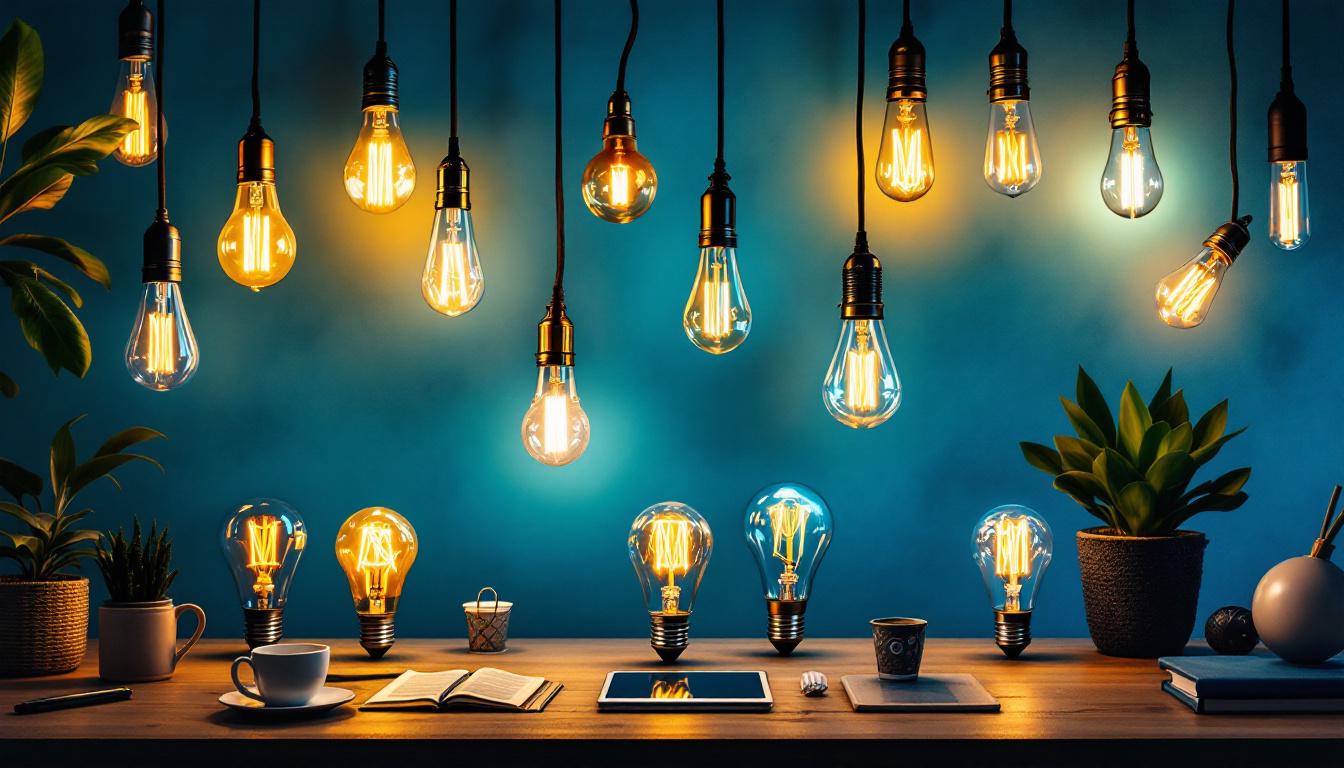
In the world of lighting installation and design, having the right resources is essential for success. For lighting contractors, understanding the various products available, their applications, and where to source them can make a significant difference in project outcomes. This guide explores the concept of a light bulb warehouse and its importance for lighting contractors, providing insights into product selection, sourcing, and the latest trends in the industry.
A light bulb warehouse serves as a centralized hub for various lighting products, including light bulbs, fixtures, and accessories. These warehouses cater specifically to the needs of lighting contractors, offering a wide range of products that can be sourced quickly and efficiently. By understanding the role of these warehouses, contractors can streamline their operations and enhance their service offerings.
Light bulb warehouses typically stock a diverse array of products to meet the varying needs of contractors. From incandescent and LED bulbs to specialized fixtures, the selection is vast. Contractors can find energy-efficient options, decorative lighting, and even smart lighting solutions that cater to modern demands.
Additionally, many warehouses offer accessories such as dimmers, switches, and mounting hardware. This comprehensive selection allows contractors to source everything they need for a project in one place, saving time and improving efficiency. Moreover, some warehouses also provide custom lighting solutions, enabling contractors to design unique installations tailored to specific client requirements. This flexibility can be a significant advantage in competitive markets where differentiation is key.
Utilizing a light bulb warehouse provides numerous benefits for lighting contractors. First and foremost, it simplifies the procurement process. Instead of dealing with multiple suppliers, contractors can find a wide range of products under one roof. This not only saves time but also helps in maintaining consistency in product quality.
Furthermore, many warehouses offer competitive pricing, enabling contractors to maximize their profit margins. Bulk purchasing options and discounts can significantly reduce costs, making it easier to stay within budget while delivering high-quality installations. In addition to cost savings, light bulb warehouses often provide expert advice and support, with knowledgeable staff available to assist contractors in selecting the right products for their projects. This guidance can be invaluable, especially when navigating the complexities of new lighting technologies or regulatory requirements.
With numerous light bulb warehouses available, selecting the right one can be a daunting task. Several factors should be considered to ensure that the chosen warehouse aligns with the contractor’s needs and business model.
Proximity to a light bulb warehouse can greatly influence a contractor’s efficiency. A warehouse located near major job sites can reduce transportation costs and time. Additionally, easy access to the warehouse can facilitate quick pickups, allowing contractors to respond promptly to client needs.
Contractors should also consider the warehouse’s operating hours. Flexible hours can be beneficial, especially for those working on tight schedules or after-hours projects. For instance, some warehouses offer extended hours or even 24/7 access, which can be a game-changer for contractors who need to source materials late at night or on weekends. This level of accessibility not only enhances productivity but also builds a reliable partnership between the contractor and the warehouse, fostering a sense of trust and dependability.
The range of products available at a warehouse is crucial. Contractors should evaluate whether the warehouse stocks the specific brands and types of lighting products they frequently use. Additionally, checking for the availability of newer technologies, such as smart lighting solutions, can be advantageous.
Moreover, it’s essential to assess the warehouse’s inventory levels. A reliable warehouse should have sufficient stock to meet demand, especially during peak seasons when contractors may require larger quantities of materials. In addition to standard bulbs, contractors might also look for specialty items, such as energy-efficient options or unique fixtures that cater to specific projects. Some warehouses even provide custom ordering services for hard-to-find products, which can save contractors valuable time and effort. Furthermore, understanding the warehouse’s return policy and warranty options can help contractors make informed decisions, ensuring that they are protected in case of any product issues.
Establishing strong relationships with light bulb warehouse suppliers can lead to numerous advantages for lighting contractors. A good rapport can foster better communication, ensuring that contractors receive timely updates on new products, pricing changes, and promotional offers. This proactive communication can also help contractors anticipate market shifts and adjust their strategies accordingly, allowing them to remain competitive in a rapidly changing industry.
Negotiating favorable terms with suppliers is vital for contractors looking to maximize their profit margins. Building a relationship based on trust can lead to better pricing, bulk discounts, and priority access to new products. Suppliers may also be more willing to accommodate special requests or custom orders for loyal clients. Furthermore, a strong partnership can result in flexible payment terms, which can significantly ease cash flow management for contractors, especially during peak project seasons.
Contractors should not hesitate to discuss their needs and expectations with suppliers. Open communication can lead to mutually beneficial arrangements that enhance the contractor’s business operations. By sharing insights about upcoming projects or anticipated demand, contractors can help suppliers prepare accordingly, creating a win-win situation that benefits both parties. This collaborative approach can also lead to innovative solutions, as suppliers may be inspired to develop new products tailored to the specific needs of their contractor partners.
Lighting technology is constantly evolving, and staying informed about the latest trends is essential for contractors. Suppliers often have insights into emerging products and technologies, making them valuable resources for contractors seeking to stay ahead of the competition. By leveraging these insights, contractors can not only enhance their service offerings but also position themselves as thought leaders in the industry, attracting more clients who value expertise and innovation.
Engaging with suppliers through regular communication can provide contractors with information about new lighting solutions, energy efficiency standards, and design trends. This knowledge can enhance the contractor’s service offerings and improve client satisfaction. Additionally, attending supplier-hosted workshops or training sessions can further deepen a contractor’s understanding of product applications and installation techniques, ensuring that they remain at the forefront of industry advancements. By actively participating in these educational opportunities, contractors can build credibility and trust with their clients, reinforcing their reputation as knowledgeable professionals in the lighting field.
Understanding the various applications of lighting products is crucial for contractors. Different projects may require specific types of lighting solutions, and being knowledgeable about these requirements can enhance the contractor’s reputation and client relationships.
Residential lighting projects often focus on aesthetics and ambiance. Contractors should be familiar with decorative fixtures, dimmable options, and energy-efficient bulbs that appeal to homeowners. Understanding the latest trends in residential lighting can help contractors provide valuable recommendations to clients.
In contrast, commercial lighting projects may prioritize functionality and energy efficiency. Contractors should be well-versed in industrial-grade fixtures, LED options, and smart lighting systems that can be integrated into larger building management systems. Knowledge of local codes and regulations is also essential in commercial applications.
Some projects may require specialized lighting solutions, such as outdoor lighting, landscape lighting, or task lighting for specific work environments. Contractors should be prepared to offer tailored recommendations based on the unique needs of each project.
Additionally, understanding the benefits of smart lighting and automation can set contractors apart. Many clients are increasingly interested in energy-efficient and controllable lighting systems, making it essential for contractors to be knowledgeable about these options.
Energy efficiency is a growing concern in the lighting industry, and contractors play a crucial role in promoting sustainable practices. Understanding energy-efficient lighting solutions can enhance a contractor’s service offerings and appeal to environmentally conscious clients.
Energy-efficient lighting solutions, such as LED bulbs and fixtures, offer numerous benefits. They consume significantly less energy compared to traditional incandescent bulbs, leading to lower electricity bills for clients. Additionally, energy-efficient products often have longer lifespans, reducing maintenance costs and the need for frequent replacements.
Promoting energy efficiency can also enhance a contractor’s reputation. Clients are increasingly looking for sustainable solutions, and contractors who prioritize energy-efficient products can position themselves as leaders in the industry.
Many regions offer incentives and rebates for using energy-efficient lighting products. Contractors should familiarize themselves with local programs that can benefit their clients. By informing clients about available incentives, contractors can help them save money while also promoting sustainable practices.
Additionally, staying updated on changes in energy efficiency regulations can help contractors ensure compliance and provide informed recommendations to clients.
For lighting contractors, understanding the role of light bulb warehouses, selecting the right suppliers, and staying informed about industry trends are essential components of success. By leveraging the resources available through these warehouses, contractors can streamline their operations, enhance their service offerings, and ultimately deliver exceptional results for their clients.
As the lighting industry continues to evolve, embracing energy-efficient solutions and specialized products will be crucial. By prioritizing these aspects, contractors can position themselves as trusted experts in the field, ensuring long-term success in their business endeavors.
Ready to enhance your lighting projects with the highest quality products at the best value? Look no further than LumenWholesale. Our spec-grade lighting selection is designed to meet the needs of the most demanding contractors, all at unbeatable wholesale prices. Say goodbye to local distributor markups and hello to a vast array of reliable, high-performance lighting options. With free shipping on bulk orders, LumenWholesale is your go-to source for cost-effective, top-quality lighting solutions. Elevate your service offerings and delight your clients by choosing Wholesale Lighting at the Best Value today.

Discover innovative strategies to ensure your lighting projects stand the test of time with cutting-edge electric light bulbs.

Discover the top challenges lighting contractors face when installing back-to-back electrical boxes for switches and receptacles.

Discover how strategic choices in hanging dining room lights can boost your business’s profitability.

Discover expert insights on selecting the best LED bulbs for home installations, tailored specifically for lighting contractors.